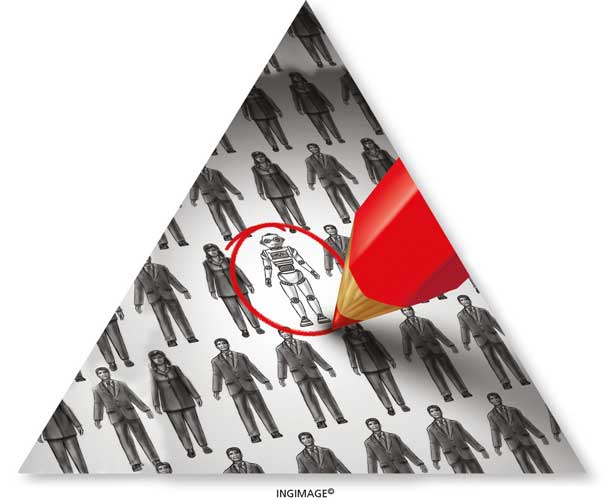WORK ENGINES
STAYING EMPLOYED
Employment in an age of automation
BY Jayashantha Jayawardhana
While artificial intelligence (AI) and automation contribute significantly to organisational advancement, by boosting efficiency and productivity, they also threaten to make redundant a substantial number of human beings.
 So it’s both a boon and a bane.
So it’s both a boon and a bane.
In a Harvard Business Review (HBR) article titled Beyond Automation by Thomas Davenport and Julia Kirby, the authors quote business leader and blogger Yuh-Mei Hutt: “The idea that half of today’s jobs may vanish has changed my view of my children’s future… How will they compete against AI; how will they compete against a much older and experienced workforce vying for even fewer positions?”
These writers also observe that “suddenly, it seems people in all walks of life are becoming very concerned about advancing automation. And unless we find as many tasks to give humans as we take away from them, all the social and psychological ills of joblessness will grow from economic recession and youth unemployment to individual crises of identity.”
The authors urge us to see this conundrum from a fresh perspective.
Rather than viewing automation as a threat to human employment or drawing a line between work that can be automated and that which can only be performed by humans, they want us to consider it as an opportunity for augmentation.
In other words, we must focus on new skills to be honed with the aid of better thinking machines.
This fundamental search for complementarities is at the heart of the augmentation strategy. To remain gainfully employed in this age of ever increasing automation, they propose five approaches with augmentation at the core.
STEP UP As conventional wisdom dictates, your best strategy would be to climb to higher intellectual ground. There will always be jobs for people who are capable of big picture thinking and have a higher level of abstraction than computers. Berg, a biotech company co-founded by cancer researcher Dr. Niven Narain, relies heavily on AI to discover new cancer drugs.
While computers take care of crunching trillions of data points, looking for patterns and forming hypotheses, a team of biochemists take over when the machines finish. To adopt this approach, you need higher intellectual credentials such as a master’s degree or PhD.
Once inside an organisation, your objective must be to stay broadly informed and sufficiently creative to be part of its ongoing innovation and strategic efforts.
STEP ASIDE Whether or not it’s on a par with a PhD or a master’s, there’s plenty of highly valuable brainwork that can’t be codified. Stepping aside is a strategy for those whose jobs don’t depend on pure rational recognition but draw on what psychologist Howard Gardner calls our ‘multiple intelligences.’
You may focus on developing your interpersonal and intrapersonal intelligences. From industrial designers and standup comedians, to hospice workers and many other professionals in-between, this may be a way to stay gainfully employed.
STEP IN The binary wisdom of computers may overwhelm us much of the time but occasionally, it comes up shockingly short.
In 2014, the New York Times ran a story about a man who had recently changed jobs and applied to refinance his mortgage. Even though he had a steady government job for eight years and a teaching post for more than two decades before that, his application was turned down by the automated computer system.
His name is Ben Bernanke and he was the former chairman of the US Federal Reserve! Bernanke had recently signed a book contract for more than one million dollars and was headed for a lucrative stint on the lecture circuit. These days, if you can step in where computers come up short, automation can’t pose much of threat to your job.
STEP NARROWLY This approach involves finding a niche within your profession that wouldn’t be economical to automate. Researchers cite the example of Gary Joyal who makes a good living by connecting buyers and sellers of Dunkin’ Donuts franchises.
So far, he has helped broker half a billion dollars worth of deals. With his encyclopaedic knowledge of this line of business, he’s a virtuoso. If this is your strategy, the deeper your expertise the higher your earning potential will be – and the more stable your job.
STEP FORWARD This means constructing the next generation of computing and AI tools. It’s about the next level of encroachment machines and involves work that is highly augmented by software.
But behind all great machines and technologies are people. So if this is your career strategy, you must be able to see the best potential areas for automation and application of AI, and employ out-of-the-box thinking.
I hope this will help you figure out how to work with automation… and stay gainfully employed.




Leave a comment